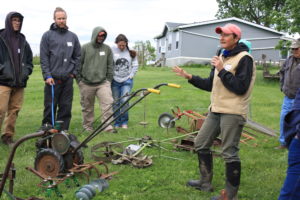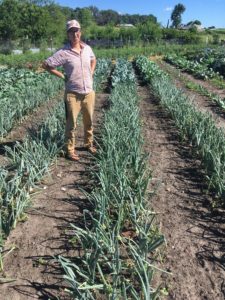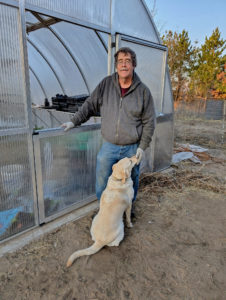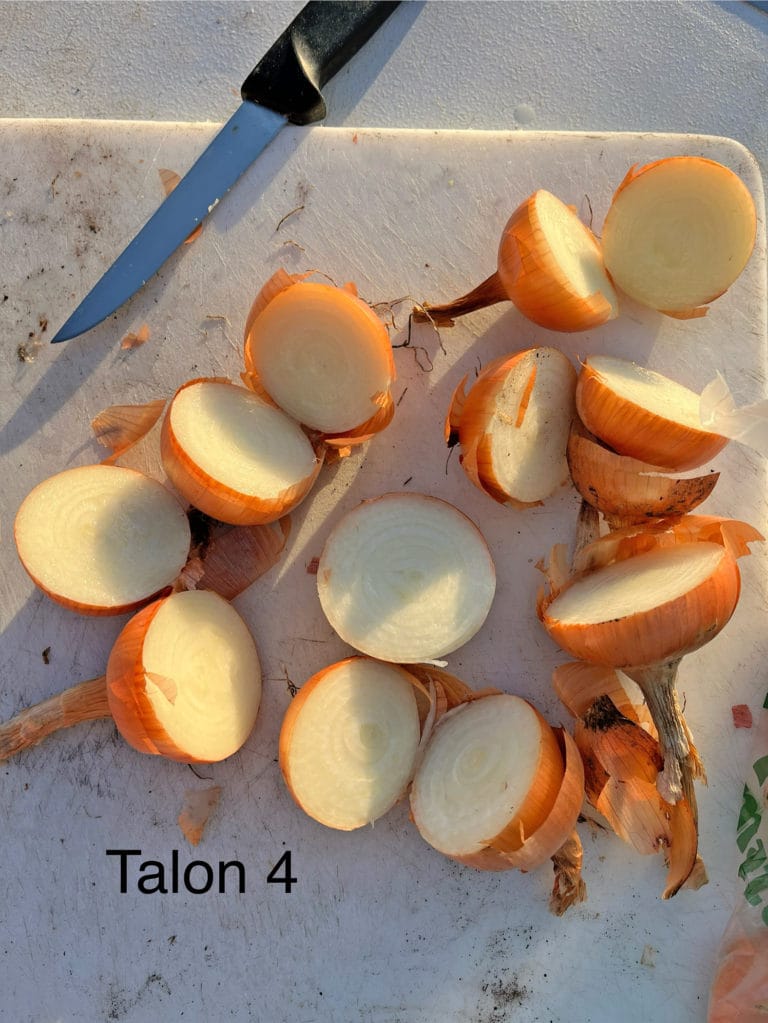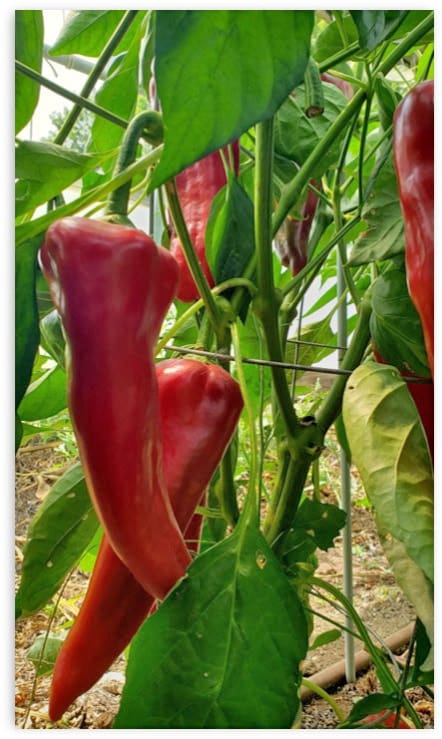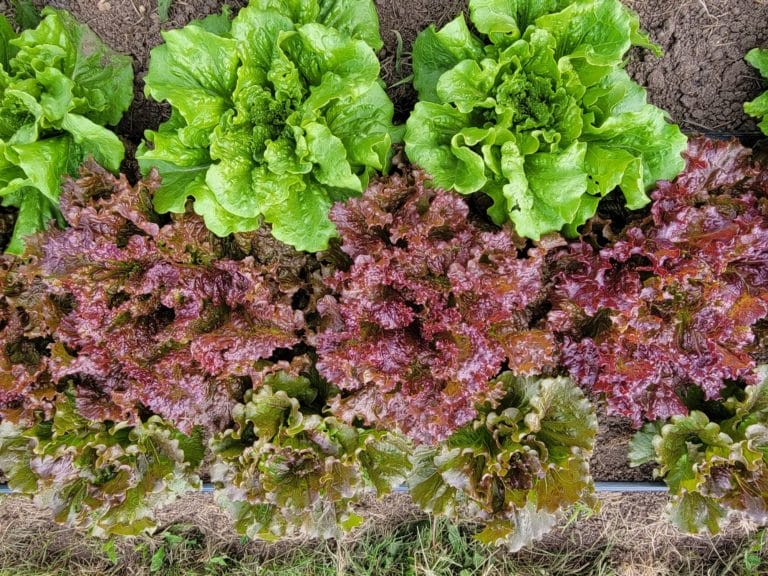Quelling the Trials of Variety
Faced with overwhelming options, some farmers use on-farm research to guide decisions about which vegetable varieties to plant.
In 2017, Jill Beebout faced a dilemma.
Like other diversified vegetable farmers, lettuce was a staple crop her CSA customers valued. But as a cool-season crop, it was hard to grow in July and August during the heat of Iowa’s summers. The plants tended to bolt quickly, prematurely shifting their energy from growing edible parts like leaves or roots to growing flowers and seeds. Even plants that looked marketable might have a bitter taste.
Jill has farmed for 20 years at Blue Gate Farm in Chariton, Iowa. In past years, the challenges of raising lettuce during Iowa’s hot season meant she couldn’t always reliably include it in her 20-week summer CSA boxes, or at her farmers market stand. In 2017, however, Jill decided to do something about it.
Hoping to learn which lettuce varieties would produce through the entire summer without bolting, she signed up for a lettuce variety trial through PFI’s Cooperators’ Program. The program empowers farmers to find answers to their specific farming questions. As part of the process, farmers work with one another, and with PFI staff, to define the question, set up and carry out trials on their farms and decide the research methods they’ll use to ensure a rigorous study.
That year, Jill joined five other farmers in testing three to four lettuce varieties. She took part in a second lettuce variety trial in 2018. “That trial was game-changing,” Jill says. “Our goal was to have lettuce in every CSA box for all 20 weeks. For three of the last five years, we have produced a lettuce crop throughout the entire growing season. When we were at farmers market, there was a big chunk of time that we were the only farmers who still had lettuce all the way through August.”
Options Overload
The trials helped Jill find some varieties that worked for her (Coastal Star, Magenta, Muir and Concept) – but it also provided a path through a gauntlet of decisions. Farmers who raise diverse vegetables may grow anywhere from a half-dozen to two or even three dozen different crops. Jill’s crop list for 2025, for instance, includes 18 different crops with two to 27 varieties of each crop, for a total of 119 unique plant varieties.
And for each crop, the farmer must choose from a sometimes dizzying array of options. Tomatoes, for example, are estimated to have upwards of 10,000 commercially available varieties. Confronting that choice can be both empowering and paralyzing. So how does one decide? Often, farmers select varieties based on their goals, their growing system and their markets.
But some vegetable farmers, like Jill, turn to PFI on-farm research trials to provide structure, focus and farm-specific data. Amid the crush of options, the trials provide focus by clearly defining a research question – like comparing one variety of spring radishes to another, or seeing how well different sweet peppers yield in a farmer’s system.
Alice McGary of Mustard Seed Community Farm in Ames, Iowa, has taken part in variety trials for a range of crops, including summer and fall cabbage, cauliflower, sweet peppers, summer broccoli and onions. “It’s important for us to be doing variety trials in Iowa because our growing conditions here are different from the places where most of the plant breeding is happening for horticultural crops,” Alice says. “Things that do well other places might not perform the same here.”
Michael Pipho of Rooster’s Crow Farm in Dunkerton, Iowa, appreciates how participating in variety trials adds structure and science to evaluating plant performance. “It commits you to looking at a good experiment rather than going with the flow in the moment,” he says.
Farm-Specific Findings
The results for each farmer-researcher may vary, yet each one matters. Because growers value different characteristics depending on their growing systems and markets, what variety works best can be highly farm-specific. Some want to offer their customers unique colors, flavors or shapes in their produce, while others select for disease resistance or storage life.
“Usually, we’re trying to solve a problem that’s really hard for vegetable farmers,” Alice says. “For example, broccoli doesn’t like Iowa heat or Iowa cold, so learning what broccoli variety procures a marketable yield and actually works really helps my farm.”
Michael appreciates how variety trials help him ground-truth whether varieties that work well for others are suitable for his farm. “My system has different soil conditions, and I use no-till practices,” he says. “So sometimes that has an effect on the varieties I choose.”
The pepper variety trial is one that stands out for Michael. At his farm, peppers are a specialty, with Carmen a long-time staple variety. However, seed prices for Carmen have risen, and Michael finds the seeds are sometimes hard to get. In doing the trial, conducted in 2024, his goal was to find a replacement variety. By the end of it, Michael was pleased with the peppers he tested. “With Corno di Torro, I found a pepper variety that I want to continue growing as a complement to Carmen peppers,” he says. “They produce for longer, so they extended my pepper season.”
Because external factors can further complicate decision-making, variety trials can also help reduce the risks and barriers associated with making a change that could be beneficial. For instance, seeds for a longtime favorite variety may suddenly skyrocket in price. Varieties that were once uncommon, and thus might sell for more, may become widely available, decreasing their profit potential. More rarely, a variety may be unavailable from any source at any price due to a crop failure or disease infestation.
“I often wonder if I’m growing the best variety of everything I grow and if there are new varieties out there that I should try. Am I just growing the same varieties because I’m in a rut or out of habit?” Jill says. “Variety trials are a bit of an encouragement to pay attention to what else is out there.”
And in a world of infinite choice, having the support, collaboration and science to clarify decisions is priceless.
Learn more
Read the results of the lettuce, broccoli and pepper trials mentioned in this story:
Or search for other vegetable variety trial results at practicalfarmers.org/research.

